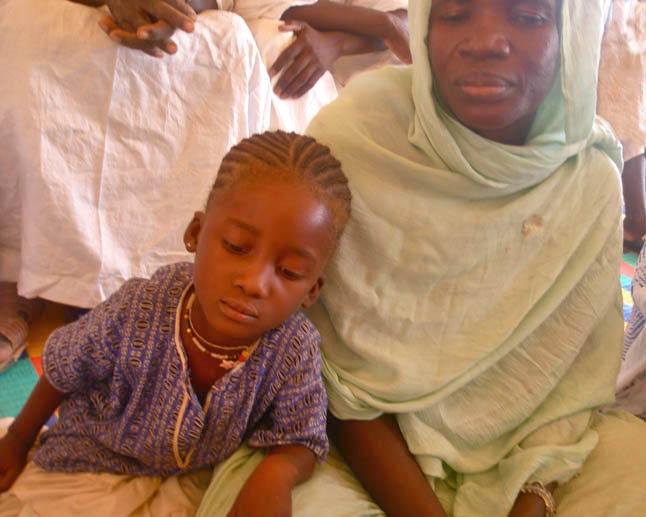

Building resilience in drought-stricken Mauritanian communities

By Brahim Ould Isselmou
Wrapped in a dark veil, Fatimetou carried her severely malnourished 2-year-old granddaughter Sabah into the feeding centre in southeast Mauritania, where communities are bracing for a severe drought and the worst shortfall of rain in decades.
The two had walked three hours from their remote village. Sabah’s family barely survives there on the produce from a tiny farm and the milk of a single goat.
“We went through an ordeal when Sabah fell sick, suffering from high fever and diarrhea,” said Fatimetou tearfully. “Without any means and totally deprived, we were helpless in the face of her worsening conditions.’’
The Gadet-Teidouma supplementary Feeding Center that took Sabah in is part of a series of interventions financed by the MDG-Fund to combat an alarming increase in malnutrition in two southeastern regions of Mauritania. In these regions, where food insecurity levels are highest and living conditions are in fastest decline, the underweight prevalence in children under five rose from 35% in 2007 to 40% in 2008, more than twice the national average.
The joint UN programme is working with the government to get therapeutic and feeding programmes to the hardest-to-reach populations, and to strengthen food security and knowledge about nutrition and health. It is improving livelihoods through micro credit loans and food-for-work opportunities, and helping to lift communities out of poverty and build their resilience and capacity to survive drought and other downturns.
“Community empowerment and leadership are the key elements of this programme, which is producing important results and impacting children’s lives’’ said Ahmed Ould Sid’Ahmed Ould Aida, coordinator for the Joint Programme.
More than 7700 children and 300 women have been treated for malnutrition and 108, 000 children have received Vitamin A supplements and deworming treatment. A project to repair levees in the region provided employment in return for food supplies and contributed to repairing community farming facilities.
Thousands of farmers have taken advantage of small credits to invest in sustaining their livestock and Village Safety Food Stocks have been created to protect communities from soaring prices.“This approach is achieving lasting results for communities,’’ said Mariam Mahamat Nour, FAO Representative in Mauritania.
“What made this programme unique and promising is the soundness of the approach, which involves all stakeholders, takes into account all the dimensions of the problem and integrates the essential interventions,’’ noted Cheikh Ould Abdellahi, Wali (governor) of Hodh Gharbi, one of the targeted regions.
The programme - funded by the Government of Spain and implemented in collaboration with the Mauritanian government and UNICEF, FAO, WFP and WHO – is part of the MDG-Fund’s innovative approach to overcoming bottlenecks and barriers through joint action, and helping countries achieve the anti-poverty Millennium Development Goals with a particular focus on the most deprived communities. "The Programme is helping to build resilience and empowering communities to protect and sustain their livelihoods,’’ said Lucia Elmi, UNICEF Representative.
In Mauritania, the two regions targeted by the joint programme are being given more robust tools to address their own conditions and cope with adversity. While there is more work ahead, for Sabah’s family, the results were immediate. “The outpatient center took care of her with ready-to-use therapeutic food and drugs. Once she was discharged and cured, her nutrition status improved quickly, thanks to the supplementary food she receives from the Community Center,’’ her grandmother said.
Click here to read other success stories from the MDG-F's work to fight poverty and improve livelihoods around the world.